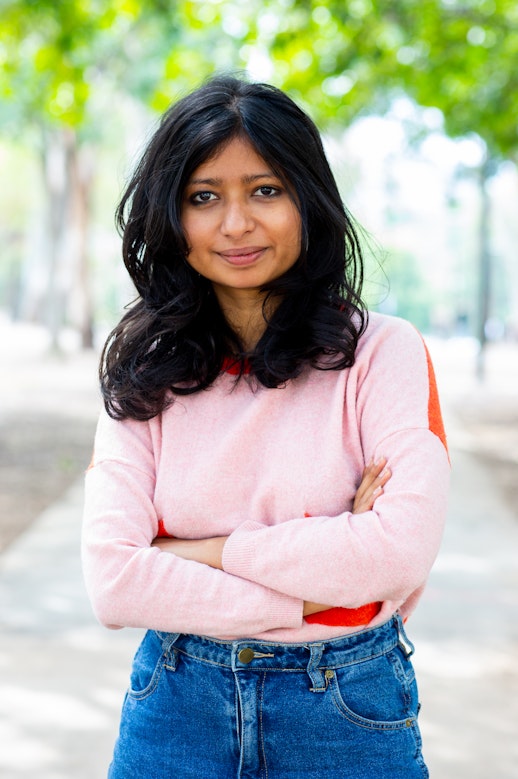Guest Editor's Letter
Neha Kale

Intimacy, from the Latin intimare to ‘make familiar’ is a state that’s thoroughly human, bound up in our desire to be known by another. But, over the last few years, the strength of our bonds has been tested by a historical moment dictated by a pandemic that has polarised communities. It’s one shaped by platforms that advertise connection, package and sell it back to us. So often, the ‘us’ that I write to feels fractured. It’s proof of a changing social contract that encourages our retreat into private bubbles of experience. A society of atomised selves.
Yet flashes of intimacy still arrive in my life with the velocity of tiny comets. The pause after an oldest friend picks up the phone. A faraway aunt who dispatches vibrating hearts over Whatsapp. A hand squeezed with the right amount of pressure, the presence of love, of flesh, amid the sterility of a hospital waiting room.
The reminder that we are bodies. Indebted and drawn to each other. Ageing, growing, yearning, failing – for better or worse.
The promises of intimacy are intoxicating: a real conversation, a moment of tenderness, the sense of being truly, deeply seen by the world around you. But the fact of colonial history and the politics of gender and consent mean that these promises aren’t available to everyone.
They have always been distributed unequally. They are subject to the violence of borders. What does it mean to be denied intimacy? How do we respond when intimacy intersects with brutality? What is its relationship with pleasure? And what does it mean when you don’t find intimacy where you expect to? Can it arise in a place you could never predict?
This issue of 4A Papers brings together different forms – from essay, fiction and criticism to memoir and photography – by Australian and international writers and artists. It explores intimacy in all its guises.
Essayist Shu-Ling Chua traces the first breath of a long-distance relationship, the paradox of closeness and distance via artists like Pia Johnson, Liu Ziqian and Vilhelm Hammershøi. The narrator of Mild Animals, a short story by Candice Chung featuring illustrations by Vanessa Low, travels to Jogjakarta, Indonesia. She finds solace in the unfamiliar as an old love burns out.
Manisha Anjali's Tambourine Road, accompanied by a soundscape, tells the story of a man who is devoted to a river. The piece, rich with allegory, imagines intimacy as a thread that binds us to a disappearing world.
In new prose by acclaimed poet and novelist Michelle Cahill, a lighthouse is the backdrop for a playful exploration of intimacy and extimacy studded with observations about the era we are living through and still trying to decode.
According to the magazines I used to read when I was young, intimacy is synonymous with sex. Or reserved for those of us who are white, or cisgender or heteronormative. In this edition, you’ll find a photo essay by Sunil Gupta, the renowned photographer and activist whose images paint a complex portrait of gay desire, as it intersects with immigration, exile and patriarchy. It features alongside new prose – a response to Gupta’s visual language – by Bobuq Sayed.
Intimacy is considered the domain of relationships, a current that runs between two people. But who we regard as an intimate, as kin and what we make invisible or dehumanise, can reflect fissures in the culture. Holes in our self-perception.
Deepa Bhasthi turns a critical gaze toward Maadathy: An Unfairy Tale by Tamil poet and filmmaker Leena Manimekalai. For Bhasthi, the award-winning 2019 film sheds light on girlhood as it intersects with caste violence. Kirtika Kain reflects on the unsung power of Banoo, a Dalit woman that appears in a short story by Baburao Bagul, a pioneer of Marathi modern literature. She also presents an original artwork commissioned especially for this issue. And Gok-Lim Finch revisits the 4A archive in a poignant piece that meditates on Dacchi Dang’s The Boat, a 2001 work that speaks to who we construct as strangers in the national imagination.
The piece invites us to consider, in Finch’s words, what it might mean to “share silences, to speak with familiarity, to hold someone in your view of the world, to stay with them as your view develops.”
It’s a sentiment that I hope that you, the reader, can take away.
- Neha Kale
Notes
Image:
Pia Johnson, Holding Still, from Mooramong Green series 2020, Archival inkjet print.
ACKNOWLEDGEMENTS
4A Papers: Issue 11 is published by 4A on the unceded lands of the Gadigal people. The project team are Neha Kale (Issue 11 Guest Editor) and Mariam Arcilla (4A Special Projects Manager), with website design by Elle Williams. This issue features images by Sunil Gupta, Dacchi Dang, Leena Manimekalai, Pia Johnson. Commissioned pieces include a soundscape by Manisha Anjali, scanned image by Kirtika Kain, and illustrations by Van Low. Sue Acret and James Roth provided funding support for this edition.
About the contributor
Neha Kale is a widely-published writer whose work focuses on the intersection of art, contemporary culture and society. Her essays, criticism, features and other nonfiction have appeared nationally and internationally.
